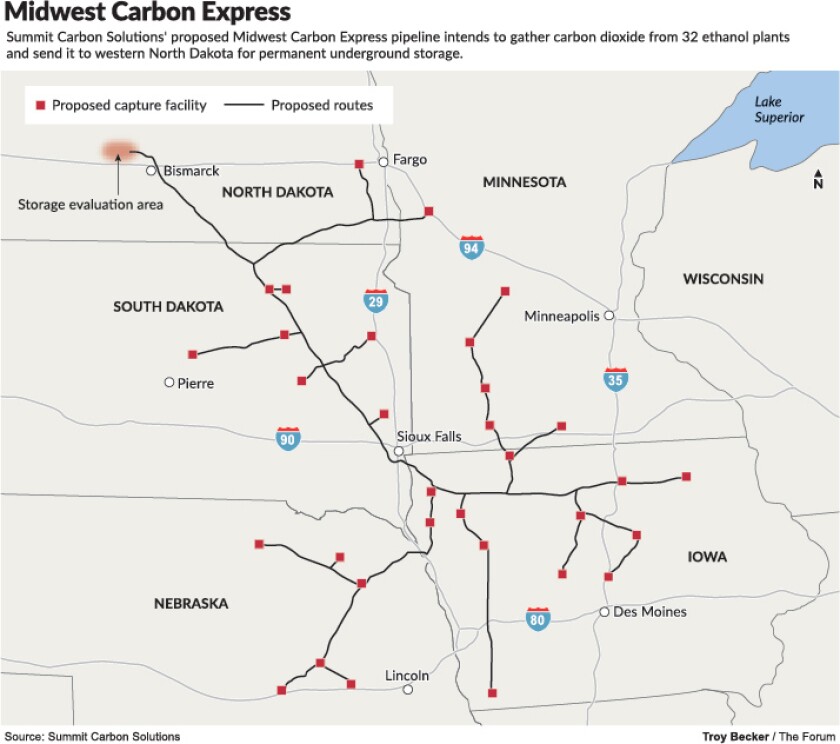ST. PAUL — An environmental assessment of a carbon capture pipeline in Minnesota will be limited to the two counties where a short segment of the pipeline runs, leaving out the bulk of the proposed project.
The Minnesota Public Utilities Commission on Thursday, Aug. 31, voted unanimously to limit the assessment to impact on Otter Tail and Wilkin counties.
The company behind the pipeline, Summit Carbon Solutions, has so far only filed for a route permit application for a 20 mile stretch in those two counties, running from the Green Plains ethanol plant at Fergus Falls, Minnesota, to the North Dakota state line.
Summit has plans for about 240 miles of pipeline in Minnesota, part of a 2,000 mile network of pipelines connecting ethanol plants in five states to an underground storage site in North Dakota.

Summit Carbon Solutions
If built, the pipeline will take greenhouse gas emissions from the ethanol plants in what Summit calls the world’s largest carbon capture and sequestration project.
ADVERTISEMENT
Some environmental groups had argued that an environmental impact study should encompass all of the planned route through Minnesota.
Commissioner John Tuma asked if North Dakota’s recent decision to deny Summit a route permit would affect the company’s plans to cross into North Dakota. The pipeline route would cross south of Breckenridge, Minnesota, and Wahpeton, North Dakota.

John Satterfield, left, director of regulatory affairs for Summit Carbon Solutions, speaks Tuesday, May 2, at Breckenridge High School during a meeting led by the Minnesota Public Utilities Commission on the company’s proposed carbon capture pipeline. With Satterfield are attorney Christina Brusven, center, and Scott O’Konek, senior project manager for Summit. Jeff Beach / Agweek
Attorney Christina Brusven, representing Summit, said route changes in North Dakota would be primarily in the Bismarck area.
Summit has requested that the North Dakota Public Service Commission reconsider its decision, but even if it has to start the permit process over in that state, it still could have a North Dakota permit before the Minnesota PUC makes its decision.
Part of that is because of the length of time to complete the environmental impact statement in Minnesota — 280 days. Brusven noted that it has already been 11 months since Summit filled for a route permit in Minnesota.
“Even a brand new application, we feel that we could make in North Dakota, very rapidly, based on the information we’ve already gathered and their process, start to finish, is still likely to be completed before yours is,” Brusven said.
The environmental study also will look at two route alternatives suggested by CURE (Clean Up the River Environment).
North Dakota is the first state to make a ruling on a Summit route application. A decision on Summit’s petition to reconsider should come by Sept. 17, 30 days after the petition was filed.
ADVERTISEMENT
Summit also is going through route permit hearings in Iowa . Hearings in South Dakota are to begin later this month.
Nebraska has no state agency with authority over carbon pipelines; instead, individual counties will make a decision on permits.


